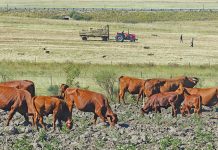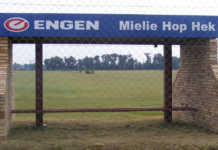Africa was a net exporter of food in the 1960s. Today, SA is one of the only African countries that are self-sufficient when it comes to food production – most of the others are dependent on food aid and imports. T his drastic change has nothing to do with a lack of resources, such as water or arable land. Some African countries in the southern convection zone have the potential to produce more grain than the entire US. The problem is rather a lack of political and economic stability, preventing agricultural industries from reaching their full potential.
It seems SA might be going the same way. Last year, for the first time, the country suffered a deficit in agricultural trade because of rapidly increasing food imports. Government must understand that profitability is the only factor influencing whether a farmer – commercial or emerging – will produce a specific product. And farmers aren’t asking government to become business partners. You only have to consider what happened to Telkom, Eskom and Spoornet to see what happens to companies that go into partnership with government. All we’re asking is for a safe, stable economic and political environment.
Farmers play a vital role in ensuring food security. In the US, more than 90% of agricultural land belongs to 5% of the population. This is considered normal and government doesn’t interfere to ensure that more people have access to land. But here, the fact that so much land is in the hands of a minority is seen as a weakness. Farmers are also made scapegoats for government’s transformation failures. Local farmers need to be internationally competitive if they want to remain sustainable and most commercial farmers are competitive due to economies of scale.
Small-scale farmers are not. Mohammad Karaan from the Department of Agricultural Economics at the University of Stellenbosch, after a recent visit to Zimbabwe, told me there aren’t any birds or mice left there because there’s nothing to eat. This is a result of commercial agriculture having collapsed. Government must understand that subsistence farming won’t feed a nation. Wheat and maize production, in particular don’t lend themselves to subsistence farming, because you need to practise crop rotation and you need large volumes.
All countries in the world feed their people from food that was produced commercially. And vegetable gardens are definitely not a solution. Our agriculture minister, Lulama Xingwana, must stop fooling herself. We’re no longer a rural economy – more than 70% of our population lives in cities. n India and China, people are moved to cities to work in industries. These countries are not encouraging a rise in small-scale farmers. They’re encouraging large-scale production in rural areas, so that people in the cities will be fed. We need to do the same. need to create jobs in cities and produce food in rural areas. Agriculture is also easily blamed for high food prices.
But it’s not our fault – input costs have more than doubled over the past year. Government has also played a role in shrinking profit margins by introducing land and water taxes. armers asked government to raise the wheat import tariff to 8% in 2005, because they were finding it difficult to compete against cheaply imported wheat. Instead government reduced the tariff to 2%. As a result, farmers started to produce less because production was no longer economically viable. And now they’re being blamed for a shortage of wheat. armers also want maize to be included for use in biofuel, but government argues this will threaten food security – many blame biofuel for the current global food crisis. truth is that the US only uses 5% of its maize production for biofuel and creating an additional market for maize will help stabilise it in the long run.
With a biofuel economy, the US is also reducing its dependence on fossil fuels. In SA this would allow farmers to significantly increase production. n terms of job creation, farmers can’t employ staff if their farms are unprofitable. Government could help them to pay their workers much more than the minimum wage by creating a more agriculture-friendly policy. S A, according to international agreements, is allowed to invest 10% of its Gross Domestic Product in agriculture. reality only 2% is reinvested. Government could empower farmers to provide more work opportunities by investing in agricultural research and more friendly policies.
This would be more beneficial than giving aid to the poor – the more aid, the less likely people are to work. Good, sound policies would also help to attract more investment. And currently nobody wants to invest, even in their own farms, with the proposed Expropriation Bill hanging over their heads. Contact Chris du Toit








